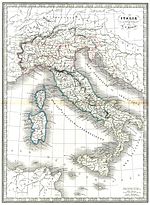
Back የጣልያን ታሪክ Amharic تاريخ إيطاليا Arabic Historia d'Italia AST Гісторыя Італіі Byelorussian История на Италия Bulgarian ইতালির ইতিহাস Bengali/Bangla Historija Italije BS Història d'Itàlia Catalan Dějiny Itálie Czech Hanes yr Eidal Welsh
| History of Italy |
|---|
 |
|
|
| Part of a series on the |
| Culture of Italy |
|---|
 |
| People |
| Traditions |
The European country of Italy has been inhabited by humans since at least 850,000 years ago. Since classical antiquity, ancient Etruscans, various Italic peoples (such as the Latins, Samnites, and Umbri), Celts, Magna Graecia colonists, and other ancient peoples have inhabited the Italian Peninsula.[1][2]
Italy was the birthplace and centre of the ancient Roman civilisation.[3][4] Rome was founded as a kingdom in 753 BC and became a republic in 509 BC. The Roman Republic then unified Italy forming a confederation of the Italic peoples and rose to dominate Western Europe, Northern Africa, and the Near East. After the assassination of Julius Caesar, the Roman Empire dominated Western Europe and the Mediterranean for centuries, contributing to the development of Western culture, philosophy, science and art. With the fall of Rome in AD 476, Italy was fragmented into numerous city-states and regional polities, a situation that would remain until the complete unification of the country in 1871. The maritime republics, in particular Venice and Genoa, rose to prosperity.[5] Central Italy remained under the Papal States, while Southern Italy remained largely feudal due to a succession of Byzantine, Norman, Spanish, and Bourbon crowns.[6][7] The Italian Renaissance spread to the rest of Europe, bringing a renewed interest in humanism, science, exploration, and art with the start of the modern era.[8]
By the mid-19th century, Italian unification, led by the House of Savoy, led to the establishment of an Italian nation-state. The new Kingdom of Italy quickly modernized and built a colonial empire, controlling parts of Africa and countries along the Mediterranean. At the same time, Southern Italy remained rural and poor, originating the Italian diaspora. In World War I, Italy completed the unification by acquiring Trento and Trieste, and gained a permanent seat in the League of Nations's executive council. Italian nationalists considered World War I a mutilated victory because Italy did not have all the territories promised by the Treaty of London (1915), and that sentiment led to the rise of the fascist dictatorship of Benito Mussolini in 1922. During World War II, Italy was part of the Axis powers until the Italian surrender to Allied powers and its occupation by Nazi Germany with Fascist collaborators and then a co-belligerent of the Allies during the Italian resistance and liberation of Italy.
Following the end of the German occupation and the killing of Benito Mussolini, the 1946 Italian institutional referendum abolished the monarchy and became a republic, reinstated democracy, enjoyed an economic boom, and co-founded the European Union (Treaty of Rome), NATO, the Group of Six (later G7), and the G20.[9][10]
- ^ Buti, Gianna G.; Devoto, Giacomo (1974). Preistoria e storia delle regioni d'Italia (in Italian). Sansoni Università.
- ^ Farney, Gary D.; Bradley, Guy (2018). The Peoples of Ancient Italy. de Gruyter.
- ^ Lazenby, John Francis (1998). Hannibal's War: A Military History of the Second Punic War. University of Oklahoma Press. p. 29. ISBN 978-0-8061-3004-0.
Italy homeland of the Romans.
- ^ Maddison, Angus (20 September 2007). Contours of the World Economy 1-2030 AD: Essays in Macro-Economic History (1st ed.). Oxford University Press. ISBN 978-0-1992-2721-1.
- ^ Sée, Henri. "Modern Capitalism Its Origin and Evolution" (PDF). University of Rennes. Batoche Books. Archived from the original (PDF) on 7 October 2013. Retrieved 29 August 2013.
- ^ Mack Smith, Denis (1970). Storia della Sicilia medioevale e moderna (in Italian). Bari: Laterza. pp. 27, 39, 45, 50–51, 98–108, 190–201.
- ^ Jepson, Tim (2012). National Geographic Traveler: Italy. National Geographic Books. ISBN 978-1-4262-0861-4.
- ^ Burke, P., The European Renaissance: Centre and Peripheries (1998)
- ^ Canada Among Nations, 2004: Setting Priorities Straight. McGill-Queen's Press – MQUP. 17 January 2005. p. 85. ISBN 978-0-7735-2836-9. Retrieved 13 June 2016.
The United States is the sole world's superpower. France, Italy, Germany and the United Kingdom are great powers.
- ^ Sterio, Milena (2013). The Right to Self-Determination Under International Law: "Selfistans", Secession, and the Rule of the Great Powers. Milton Park, Abingdon, Oxon: Routledge. p. xii (preface). ISBN 978-0-4156-6818-7. Retrieved 13 June 2016.
The great powers are super-sovereign states: an exclusive club of the most powerful states economically, militarily, politically and strategically. These states include veto-wielding members of the United Nations Security Council (United States, United Kingdom, France, China, and Russia), as well as economic powerhouses such as Germany, Italy and Japan.